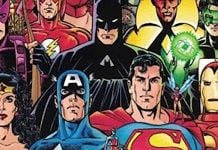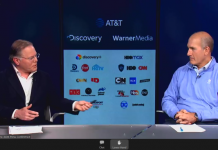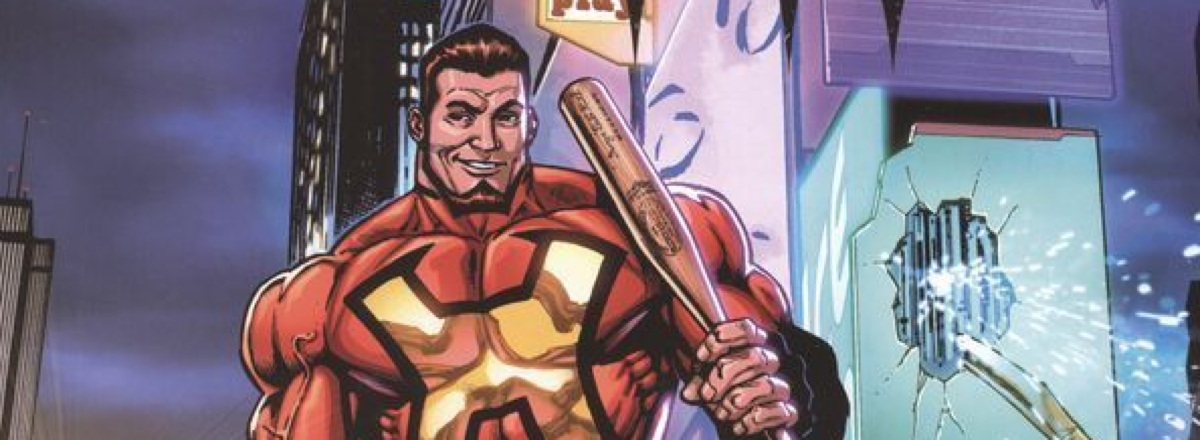by Jeffrey O. Gustafson
Thursday at New York Comic Con, BOOM! Studios held their panel, “Editing Comics: The BOOM! Studios Way.” Attending were creators Mike Kunkel (cartoonist, Hero Bear and the Kid), Michael Alan Nelson (writer, Valen the Outcast, Day Men), Eric Esquivel (writer, Freelancers), Caleb Monroe (writer, Steed and Peele, Peanuts), and Grace Randolph (writer, Superbia), and editors Dafna Pleban and Rebecca Taylor (who moderated the discussion). It was a lively and freewheeling discussion that covered the process of making mainstream comics, the challenges of dealing with licensed and creator-owned material, the relationship between creators, editors, licensors, and retailers, and much more.
Pleban began by going over the nuts-and-bolts of the average life cycle of a book at BOOM!, from the pitch, to assignments, to approving the script, art, and on through production. She stressed the need for consistency and the proper role of the editor in the creative process, noting “when we finally get to scripting, we [the editors] don’t waste the writer’s time, making them do draft after draft after draft, because one of our key jobs is to keep all our freelancers and contributors excited. Putting someone through a thousand notes or a thousand drafts will break anyone’s spirit. Including the editors.” After going through the publishing process, she notes the importance of the direct market retailer: “Retailers are our lifeline. If we don’t keep our promises to the retailers, why would they trust us on the next issue?”
Before getting into the philosophy and practice of editing, Taylor asked the panelists what distinguished BOOM! as a company. Kunkel, noted the sense of support creators receive from editorial, with editors playing the same role as producers on a movie, facilitating the creator’s vision within the confines of producing timely, quality material. Nelson agreed, “What makes BOOM! unique its sense of devotion to the creator’s vision all the while making the book the best book that it can possibly be. BOOM! is known for the quality of its storytelling, and that’s not easy.” Esquevel noted the unseen but vital role editors play. “They don’t have the sexy job of being the front-man, of being the creator,” but when they succeed, they make everyone else shine.
Monroe noted the amount of support and trust editorial at BOOM! has in creators, and the thoughtfulness they put into every project. “They spend a lot of time considering who they want to work on a book. It’s not plug-and-play.” Pleban reinforced the importance of trust. “We’re here to grease the wheels, not to get in anyone’s way… We’ll offer suggestions, if we think something’s a bad idea, we might push back a little. But we didn’t hire you because we disagreed with you. [Interference] is not fun for anyone. The moment the process stops being fun, you get bad comics. It’s that simple.” She added, “as editors, we have to not be didactic, we’re not writers, we’re editors. We don’t want to write the book for you.” Randolph: “Make sure you don’t have an editor who wants your job. That’s a book not worth doing.”
When working on books, Taylor wants creators to be able to be pliable enough to accept notes but to not roll over and give in to every suggestion. Randolph also doesn’t want a yes-man or yes-woman from editors, “that’s not going to help you.” Pleban stressed that editorial is coming from a place of goodwill and making quality work, and that it is never personal. Taylor asked about fostering trust between creative and editorial, and Monroe noted the difference in the company culture at BOOM! where he feels he’s working with friends and that makes a huge difference in the relationship and subsequent work.
When discussing the differences between creator-owned and licensed properties, Randolph noted that with creator-owned books the buck stops with the creator, where with licensed books there are many levels of approval. Pleban, who professed her love for fandom, says she loves working on franchise comics. “Franchise isn’t scary to me. I love the problem of trying to tell a story with restrictions. It’s fun… We’re genuine fans of our franchises, we’re genuine fans of Adventure Time and Planet of the Apes.” (Esquivel calls the fun of playing with licensed books the “nerd olympics.”) At the same time, she enjoys guiding creator-owned work, “I love being able to help a creator realize their vision. I get to sit down and talk with a writer about a book that doesn’t yet exist.” Monroe pointed out the importance of BOOM! as a buffer between the creator and the licensor, and the importance of keeping the licensor on schedule as well as the creators. Monroe also appreciates the amount of experimentation BOOM! allows with their licensed books, and the necessity for telling the story with the same passion as your creator-owned material. Nelson pointed out that once you can have a track record of quality storytelling, the licensor puts more trust in the creator’s vision.
Taylor opened up the floor to questions, and Pleban was asked about editing artists. “You don’t want to give the note after the page is done. I’m not going to give a thousand notes after they’ve already finished the page, because I’m not an asshole. If you have to give a thousand notes on an artist, you chose the wrong artist.” The editors create steps along the way of production to eliminate any problems before they arise, and to let the artists do their job. She pointed out the importance of clarity in scripting, like simple directions like whether or not a scene is set in the day or night, so as not to force corrections on the colorists. Randolph appreciates that BOOM! found the artist for her creator-owned book, and the nature of collaboration between the artist, editor, and writer. Monroe noted the importance of catering scripts to the artist’s unique sensibilities.
When asked about how to initiate relationships with editors, Nelson said “buy them a drink.” Build a casual relationship with the editor and get to know them without being forceful. Esquivel said “show the editors you can do the work.” Producing consistent, finished material on a regular schedule – as Randolph pointed out, much easier today with the relative simplicity of self-publishing – will do more to get you in the door that anything else. (This is advice that I have always seen editors and creators always give about breaking in, and my own experience dealing with creators at every level of the spectrum confirms that basic truism: if you build it, they will come.) As for becoming an editor, there is no school, no set way of breaking in, and the editors had their own individual paths that has the common element of working their way up from the bottom and having genuine passion for the material. Pleban: “The nice thing about this industry is that it’s pretty porous.” Taylor noted that BOOM! Editor-In-Chief Ross Ritchie broke in by editing an anthology for fun that got him noticed.
Finally, I asked the panel about the recent nightmare stories of editorial interference and subsequent creative exodus at DC: “…Obviously you can’t speak to how other companies do their business, but as editors how do you respond to these stories, and as creators, how do you respond to last-second changes and interference?” Randolph adamantly said, “I have tremendous respect for the difficult decision it was for those creators to quit. It’s so tragic because they had their dream job and it turned into a nightmare, as you said. But at the end of the day, all you have is your reputation. Your name is on that work. It was very brave of them to quit.” Esquivel noted that he has never had anything like that happen to him at BOOM! and brought up Paul Jenkins’ recent statements about editorial interference elsewhere and why Jenkins decided to work with BOOM!. Pleban was sympathetic to the possible difficulties the editors are dealing with, noting that “it probably sucks all around, and I just feel bad.” Nelson noted that if you “no longer feel like your name on the book represents something that you’ve done, then you need to walk away, but that line is different for everyone.”









Comments are closed.